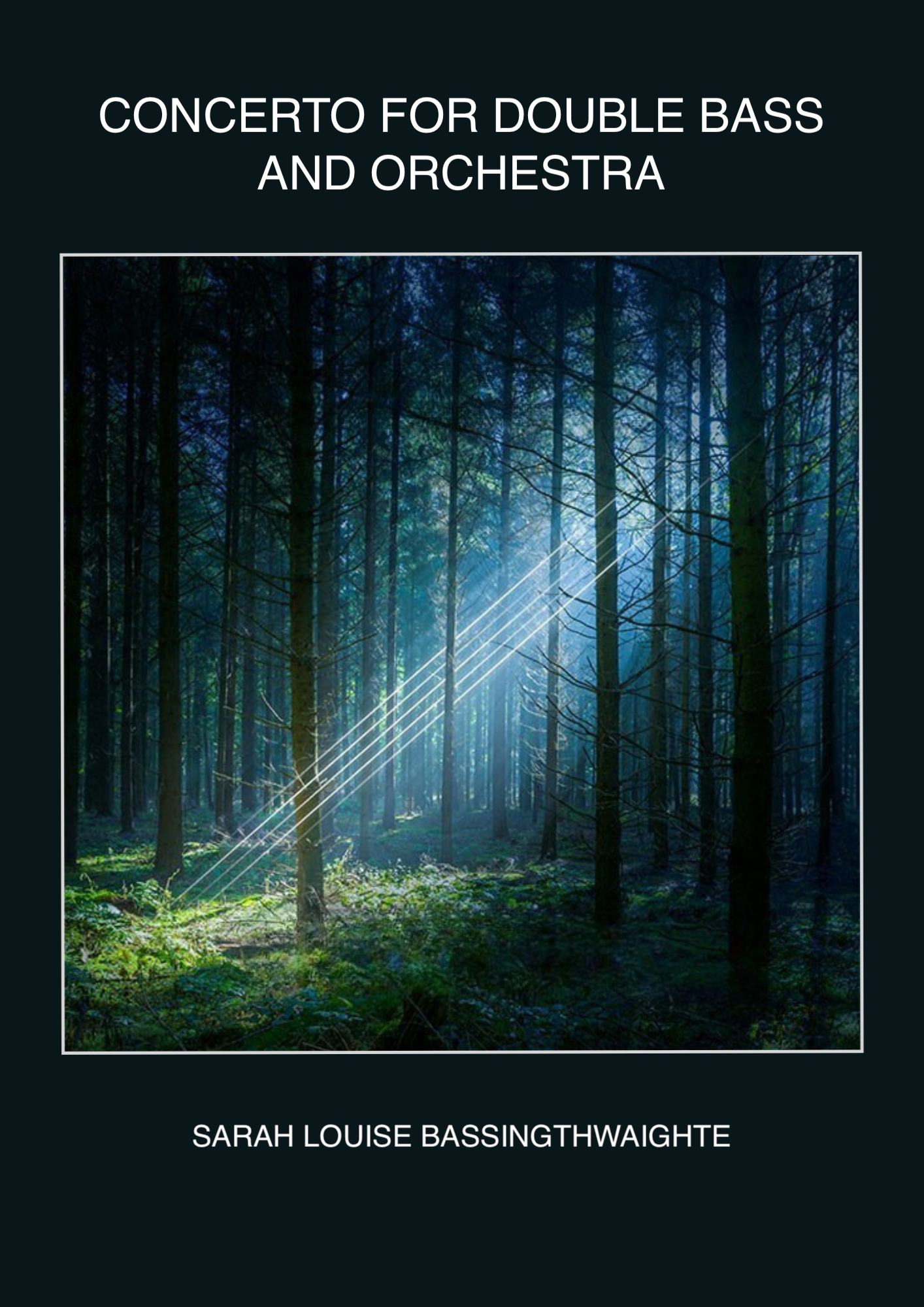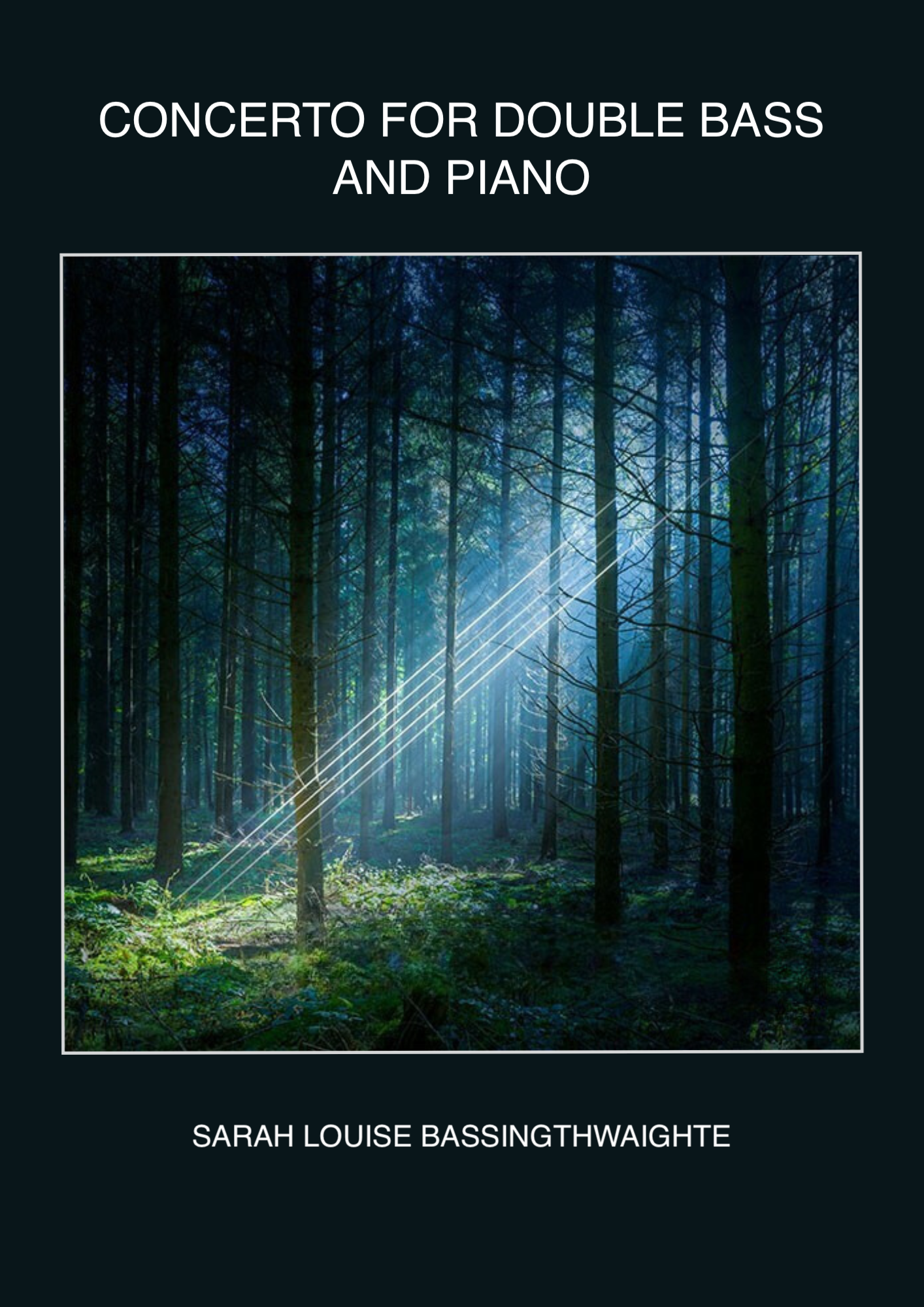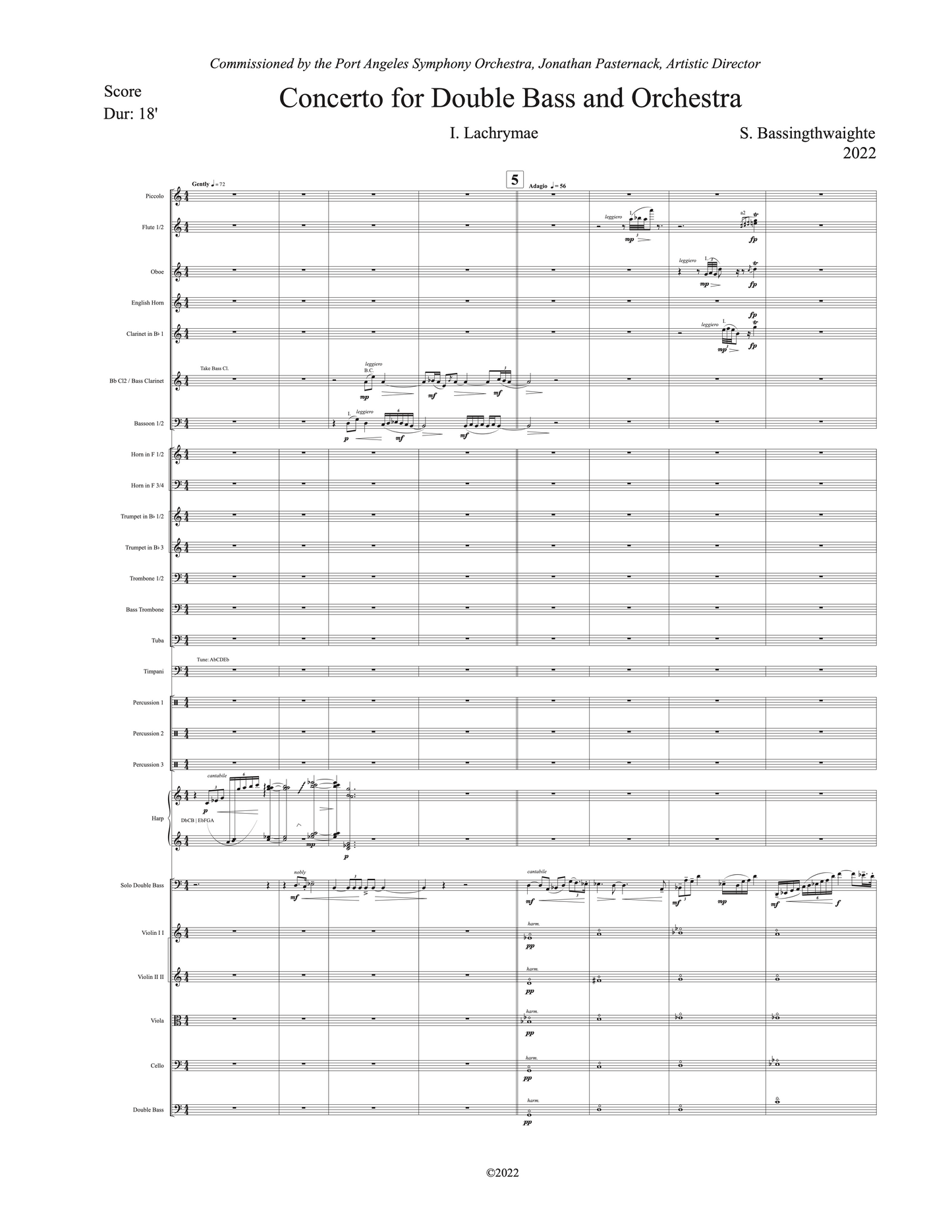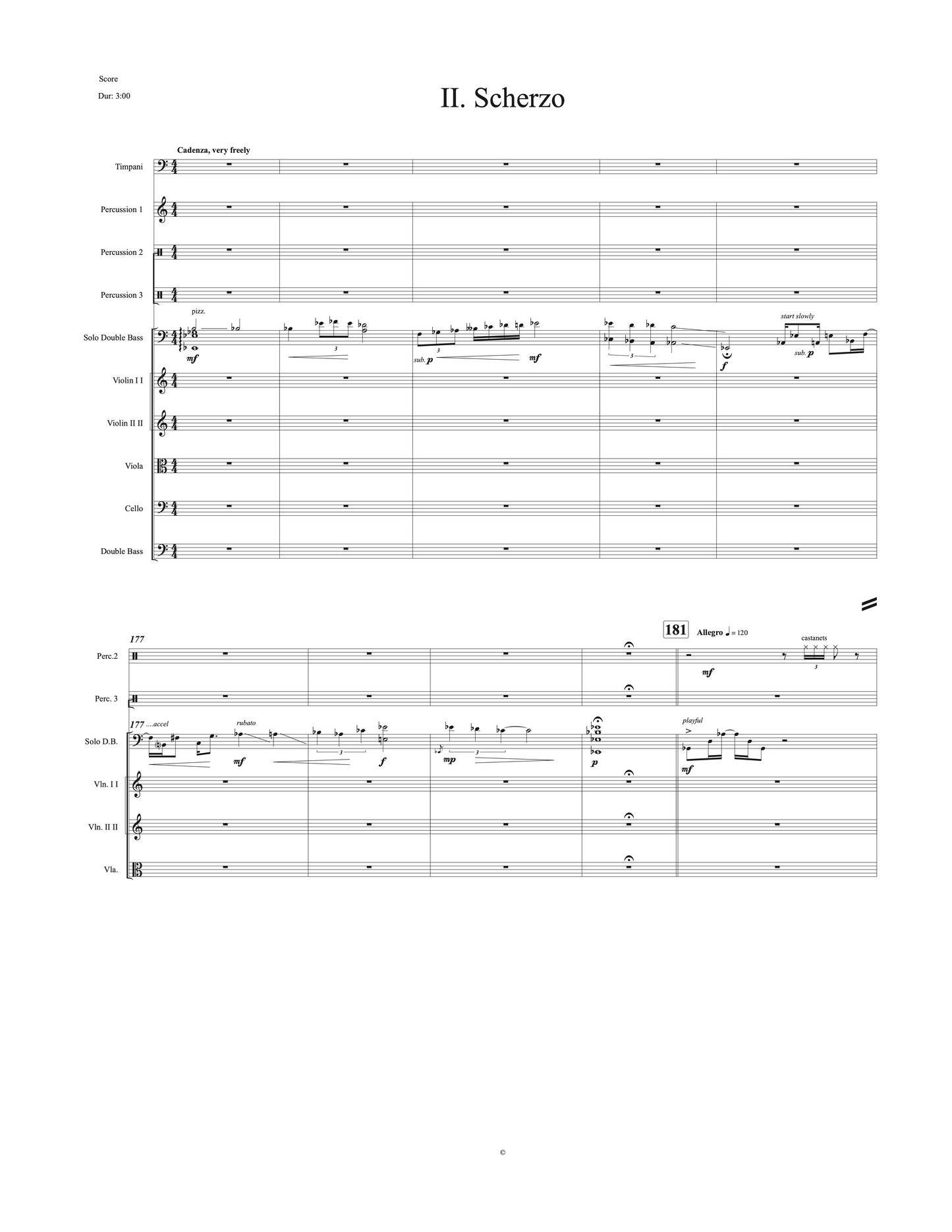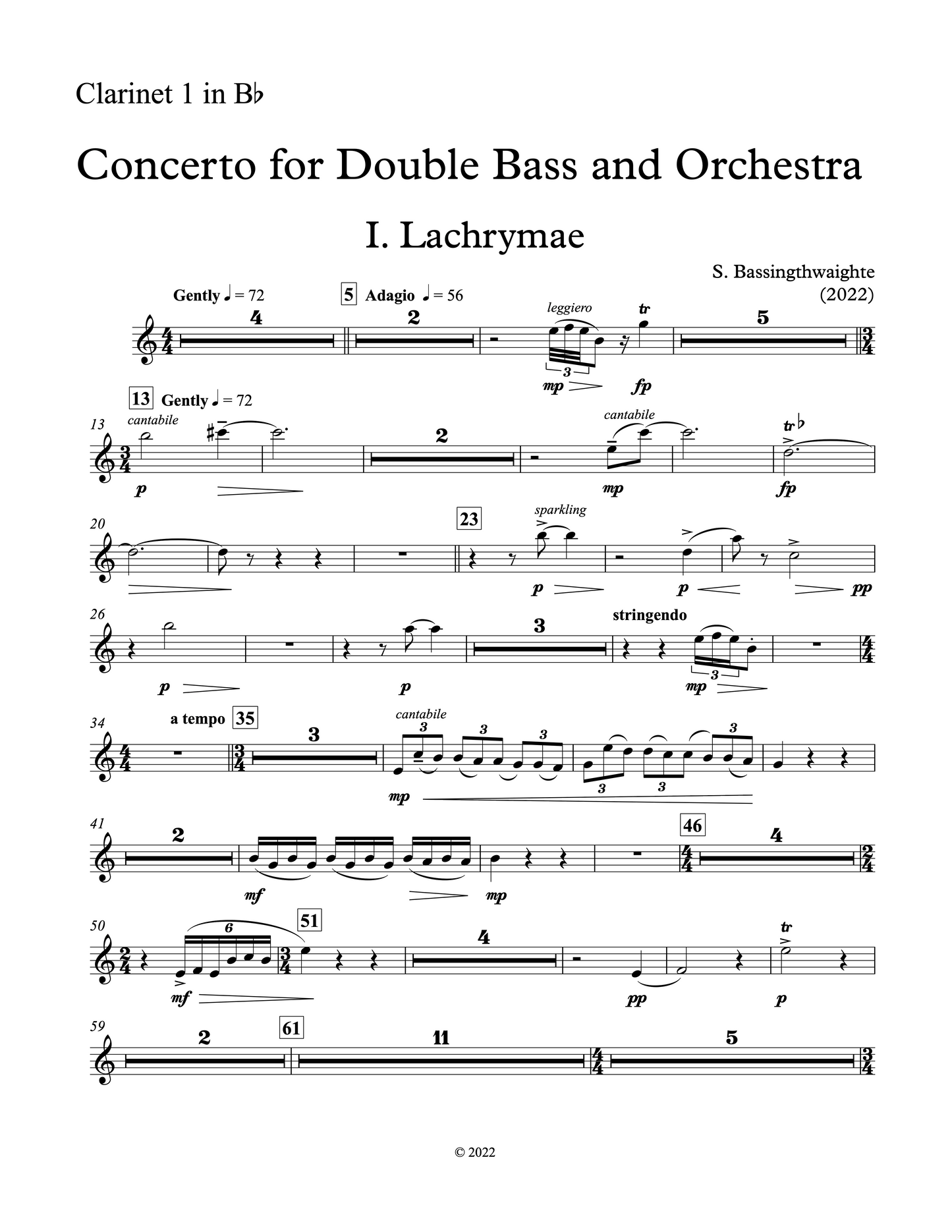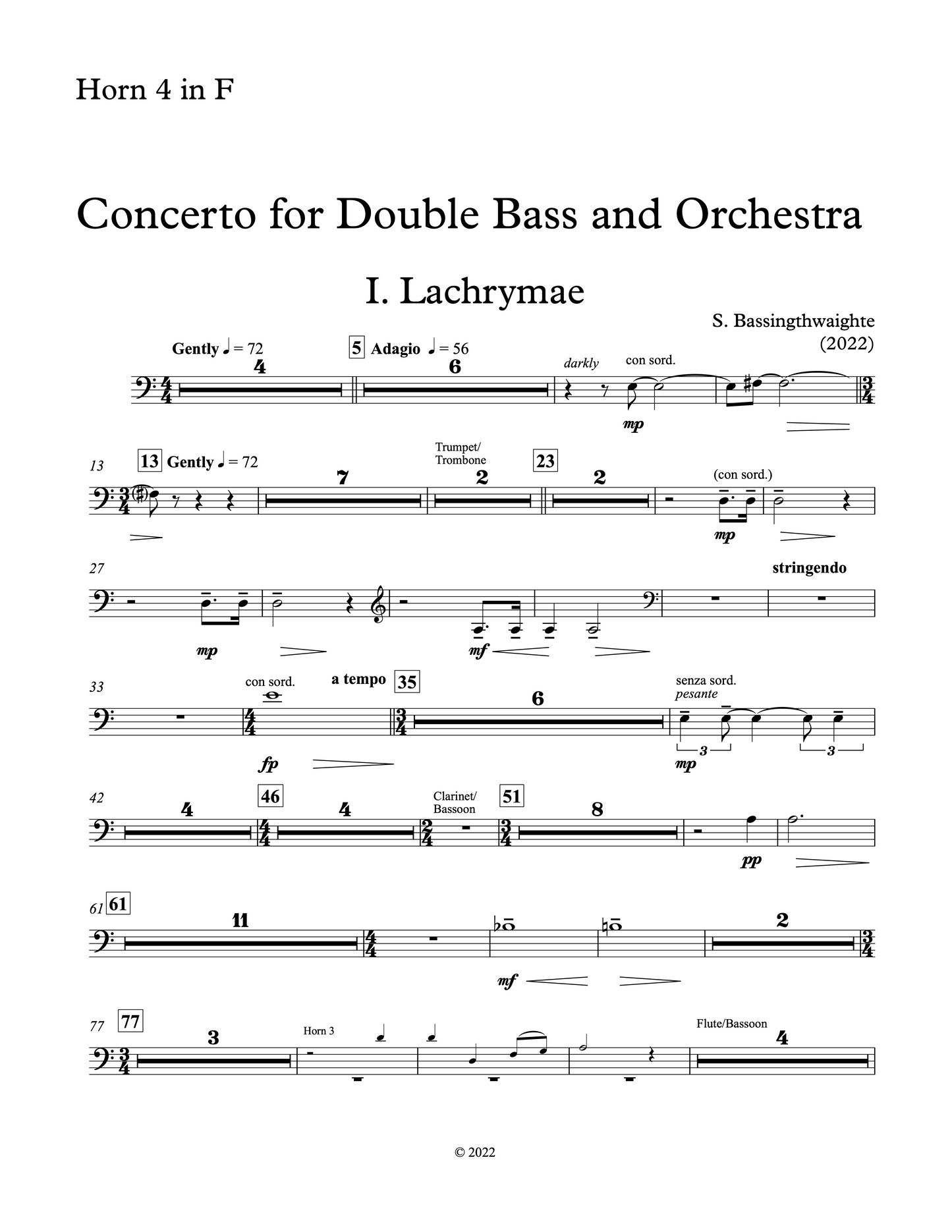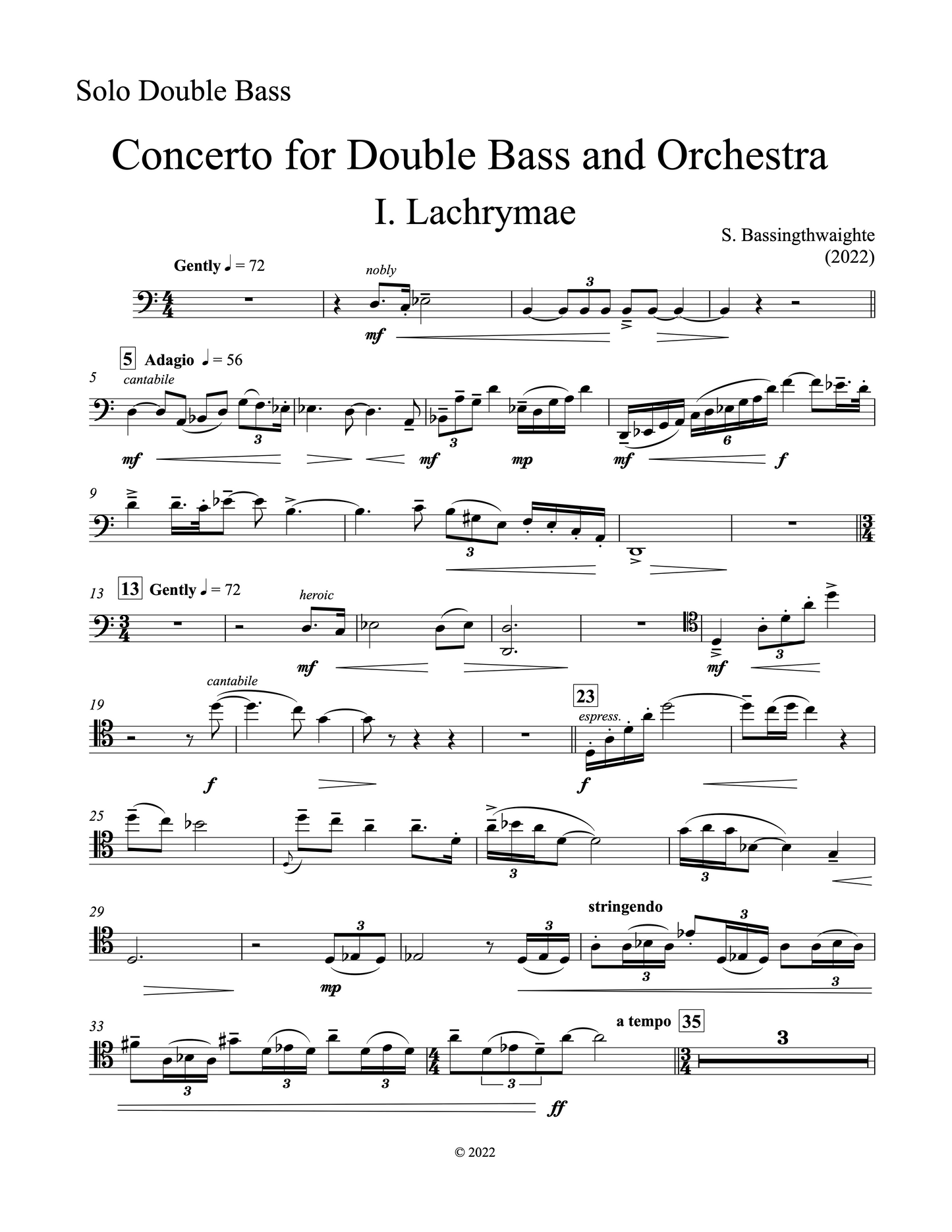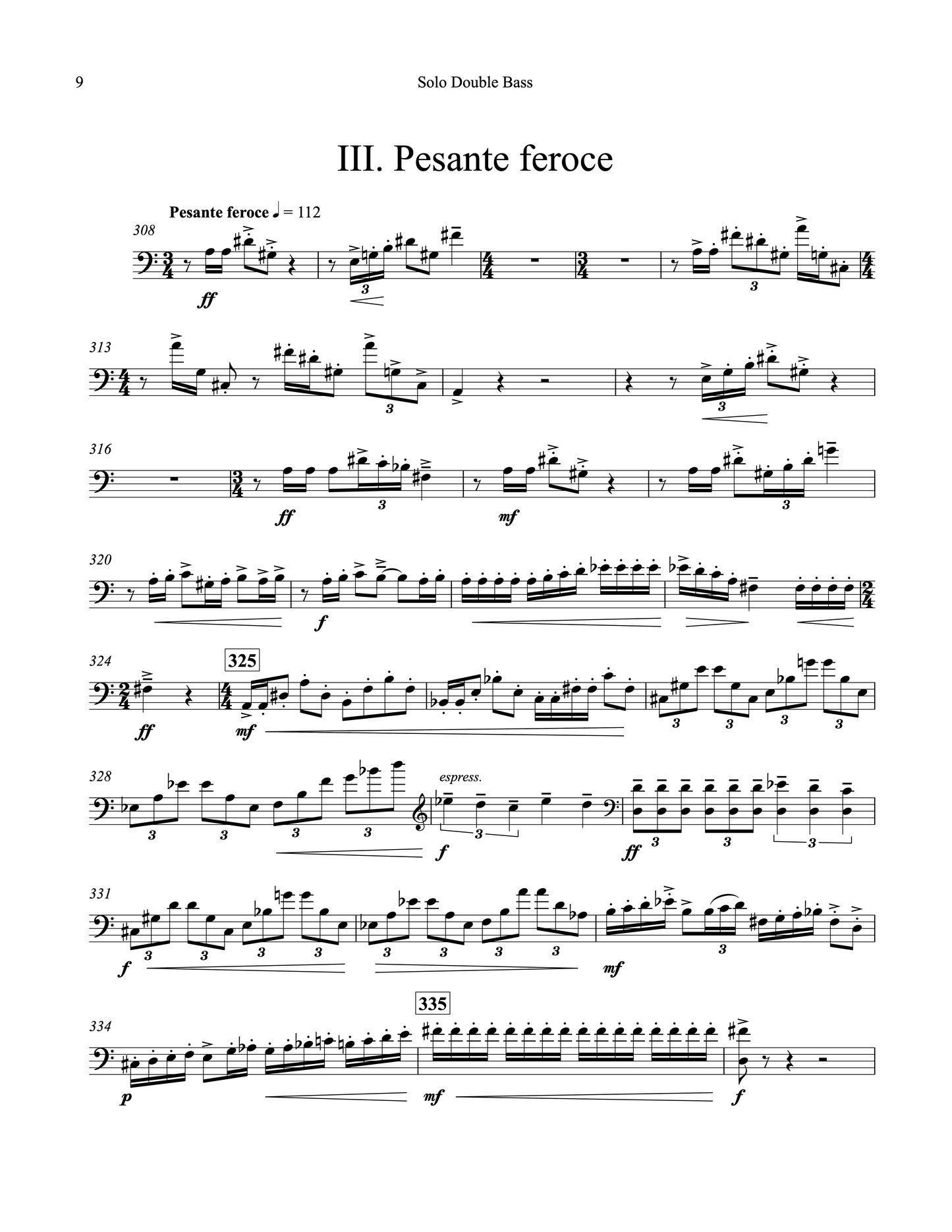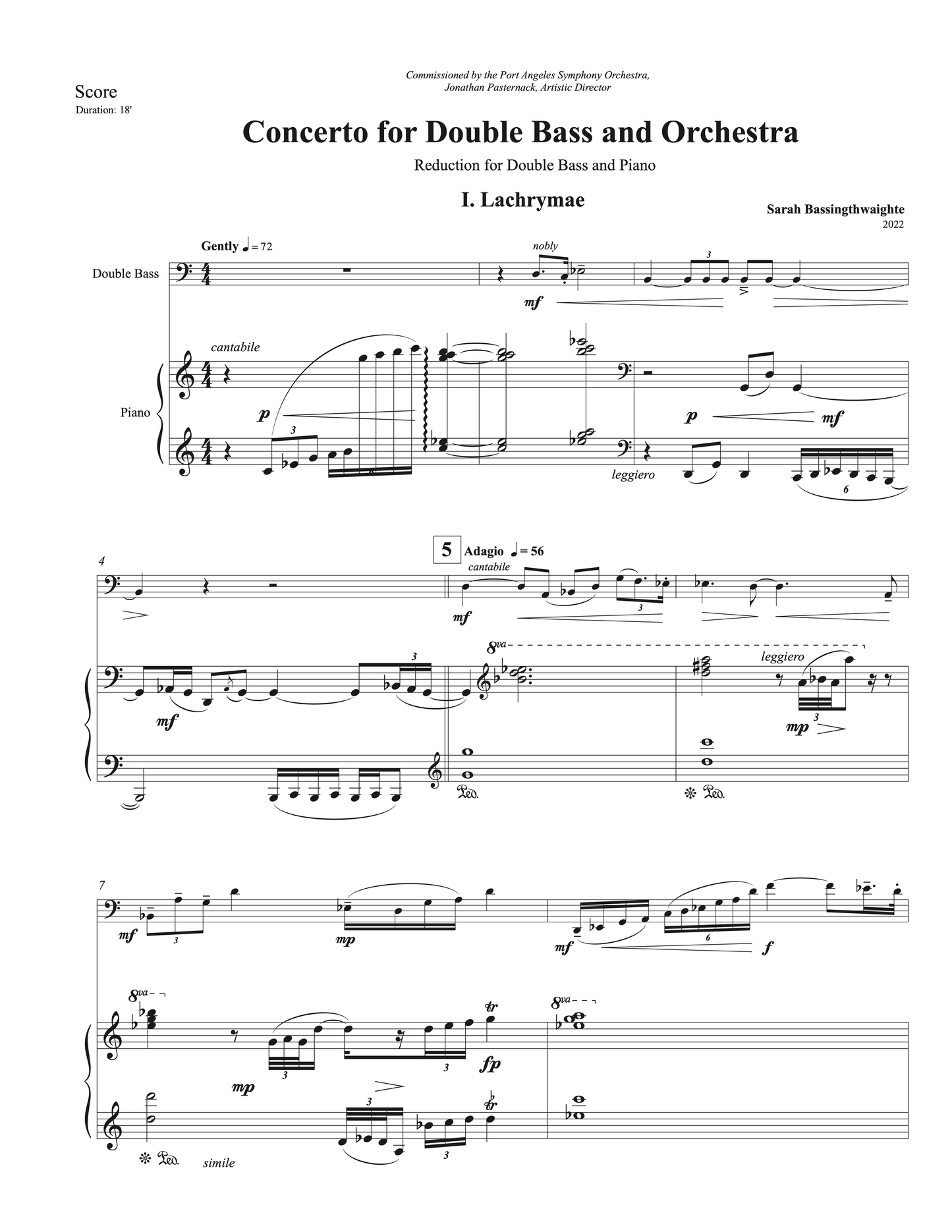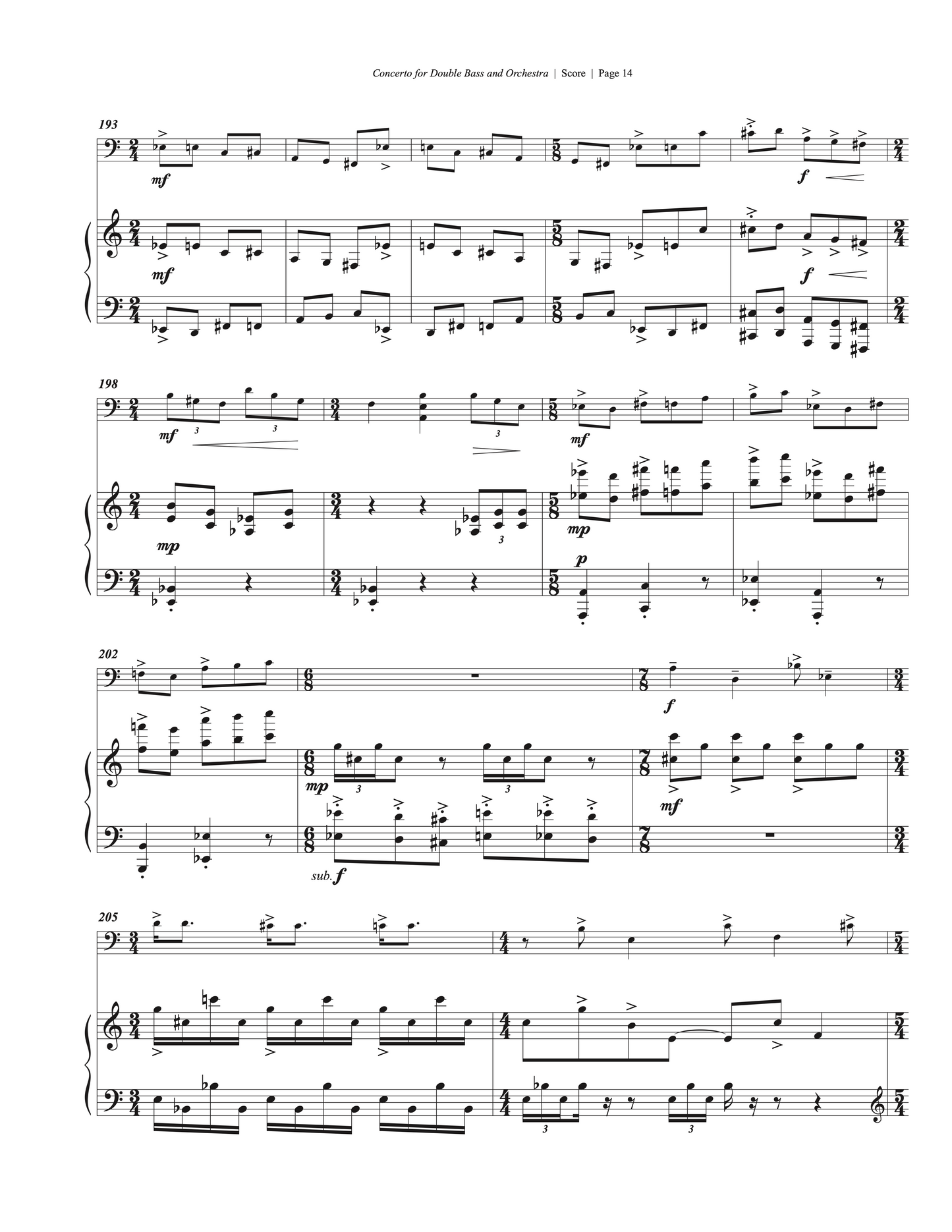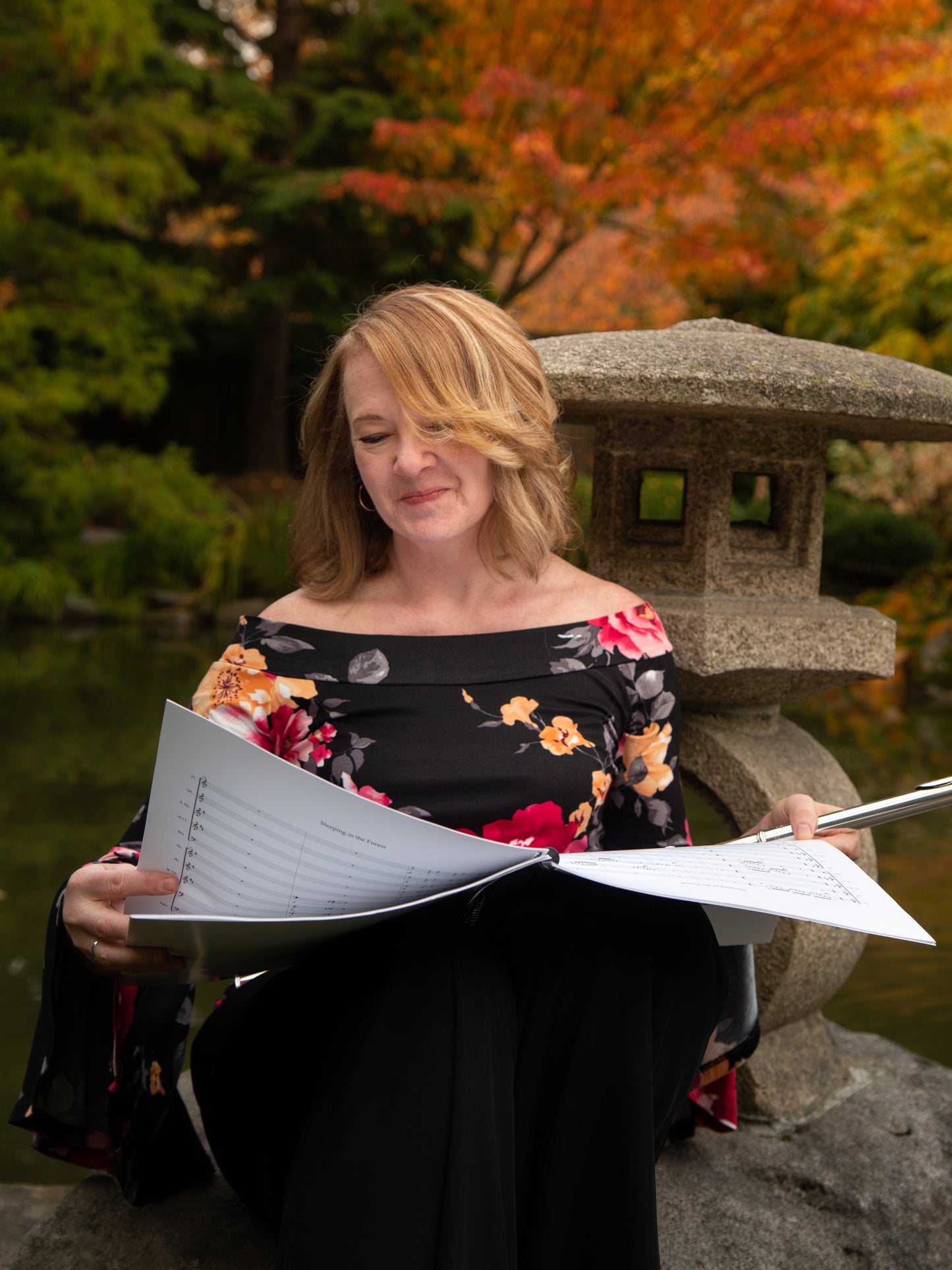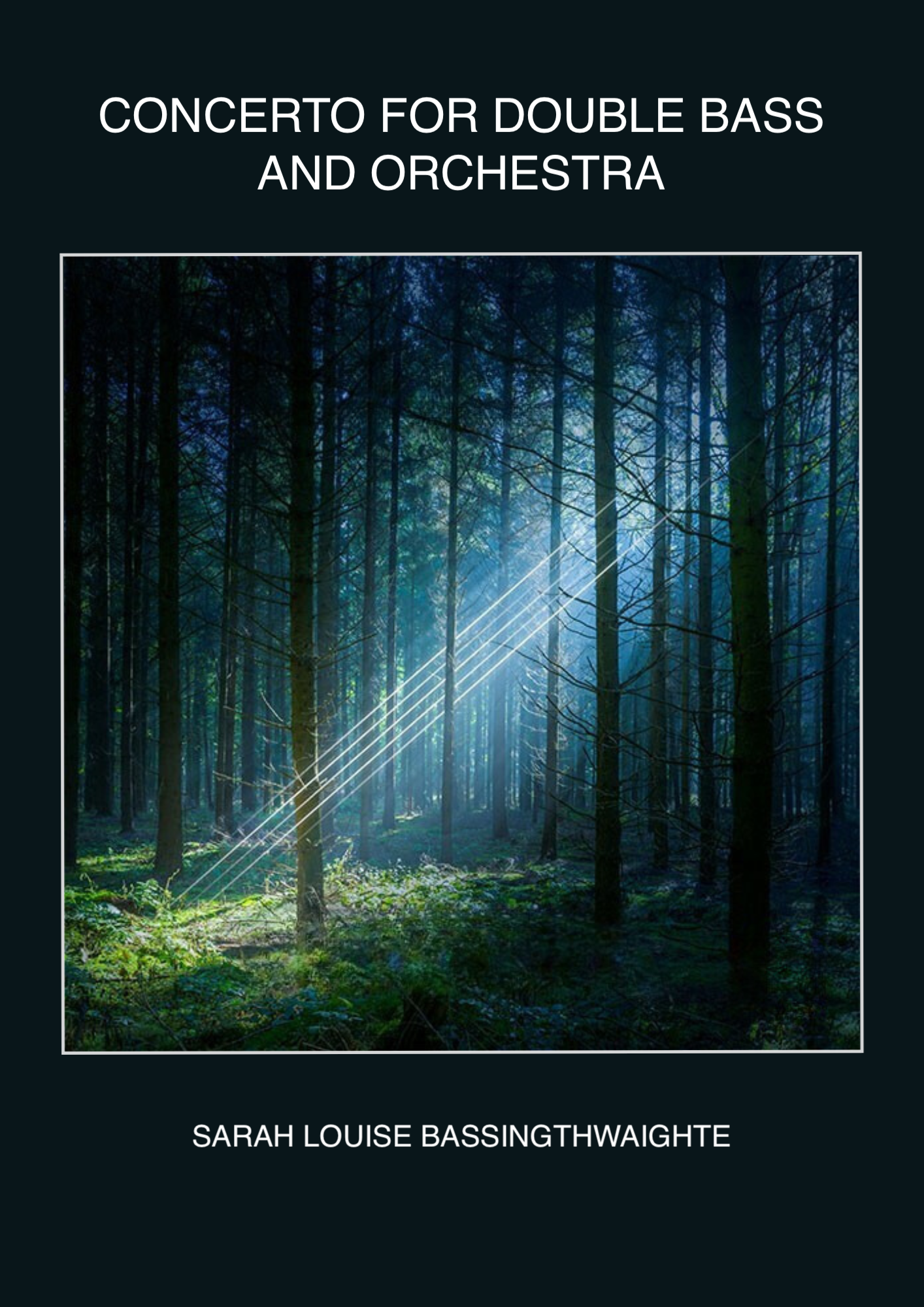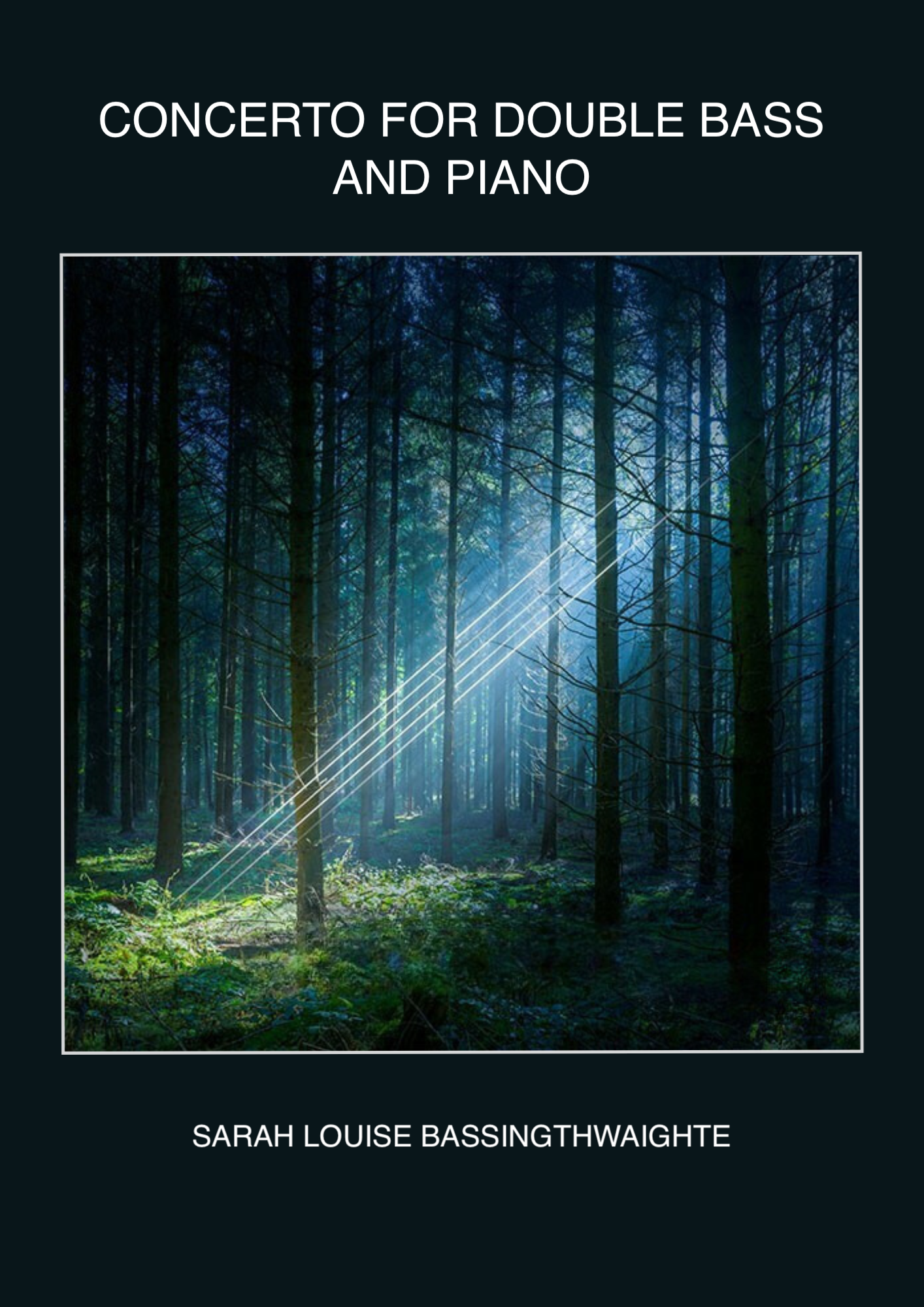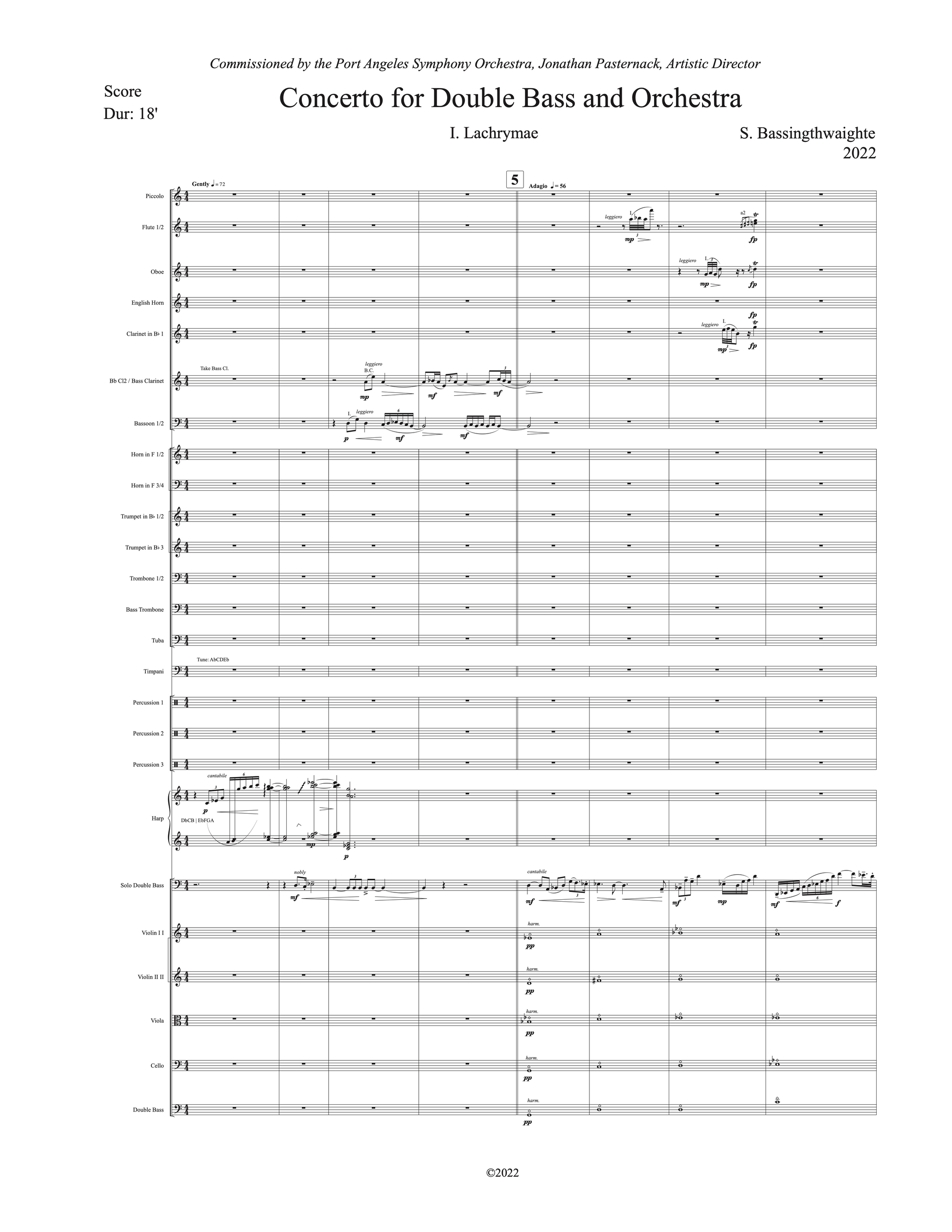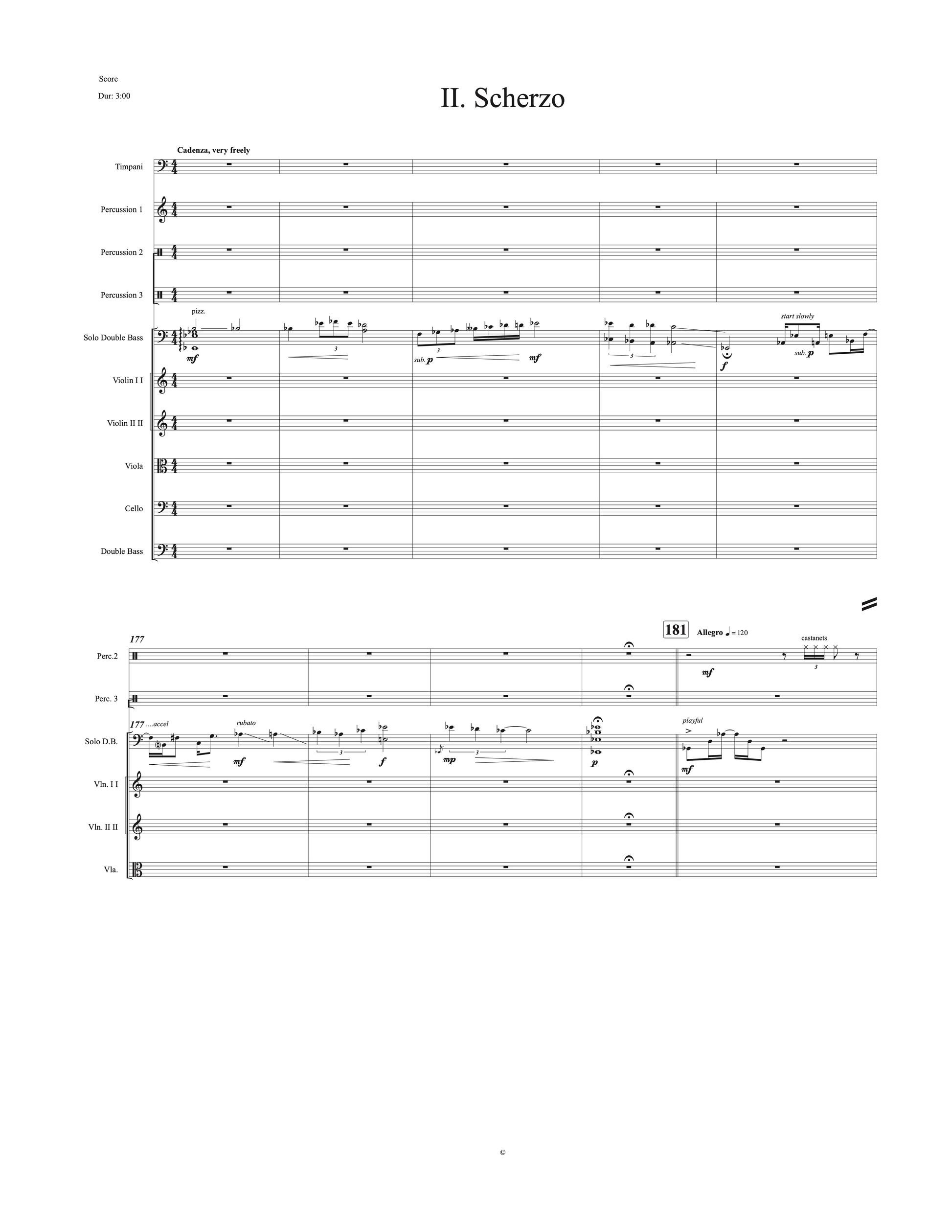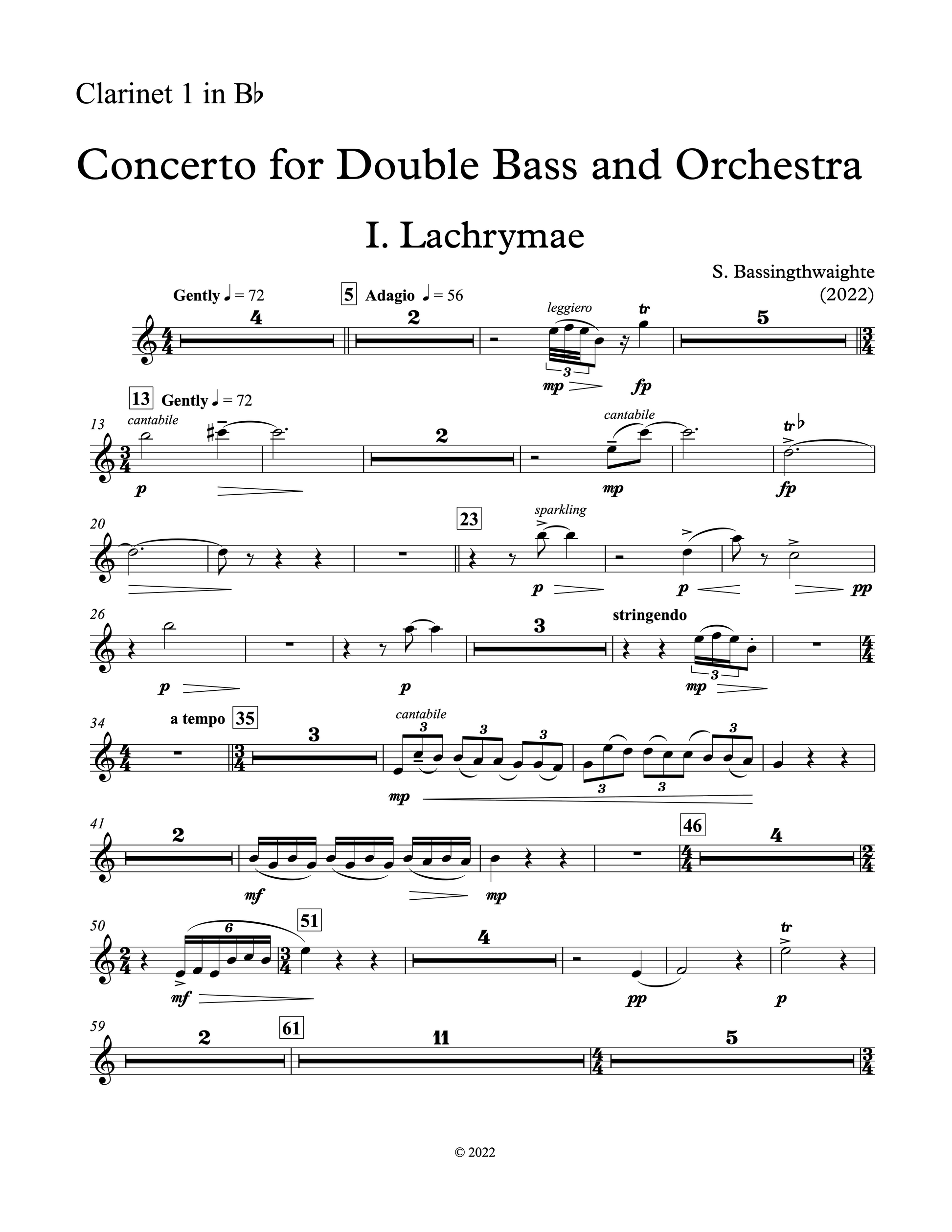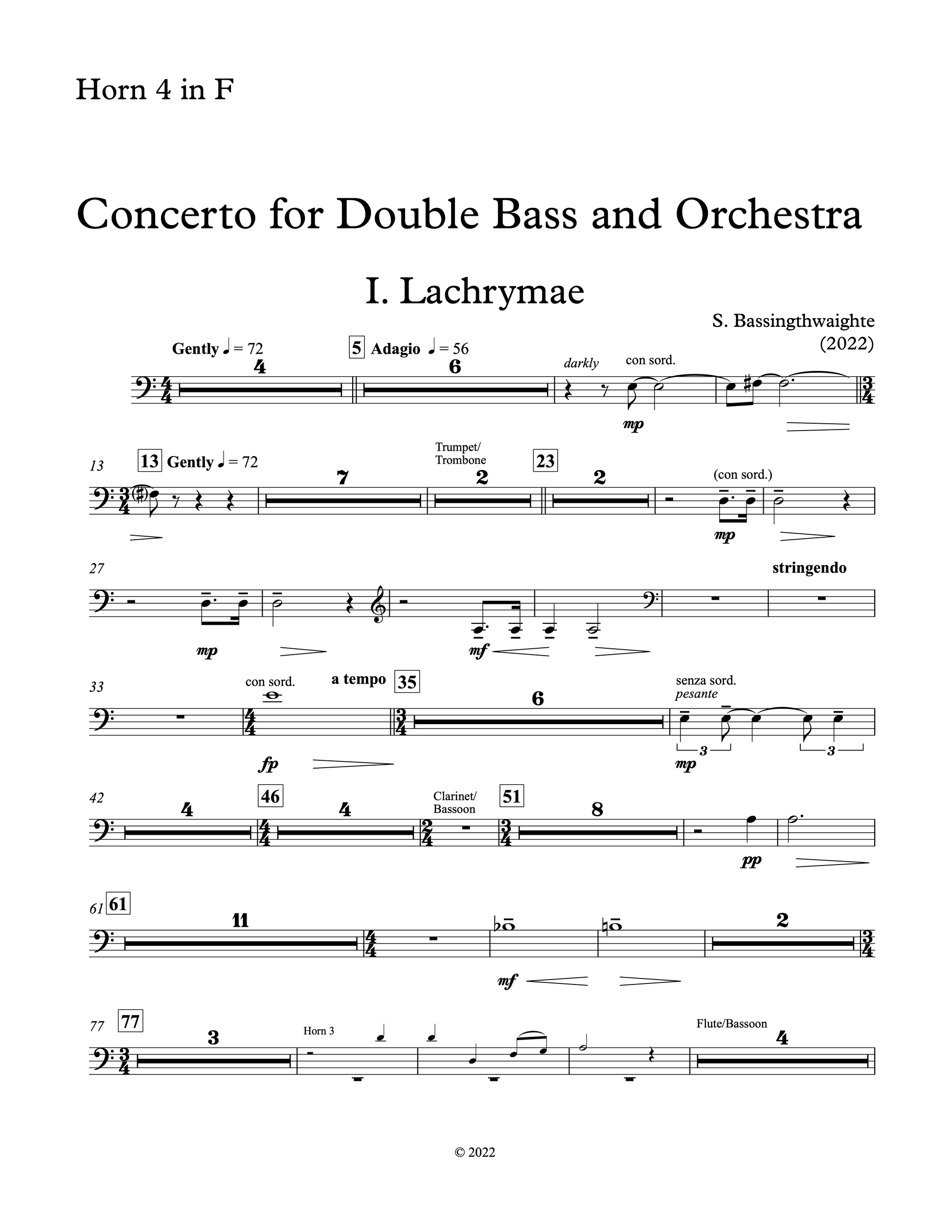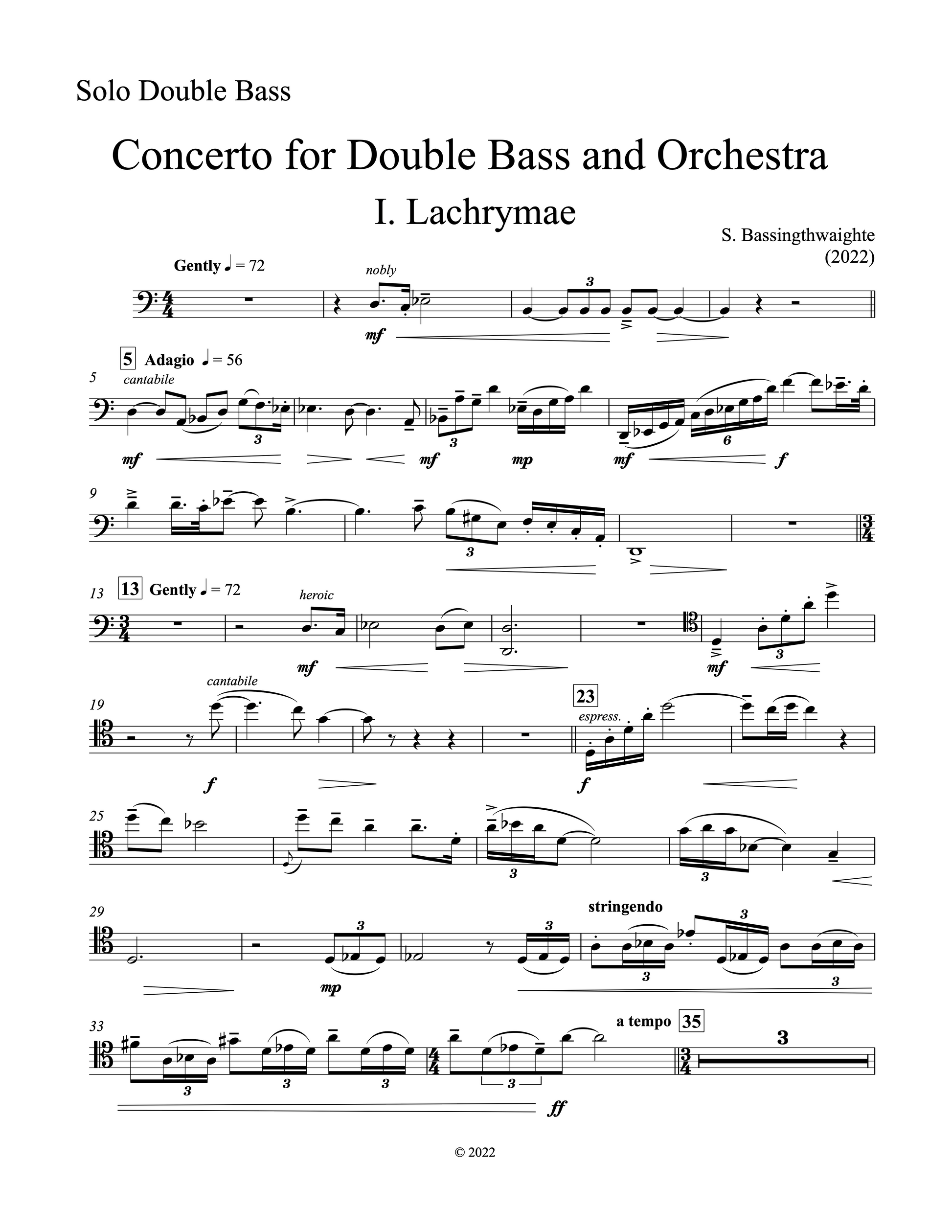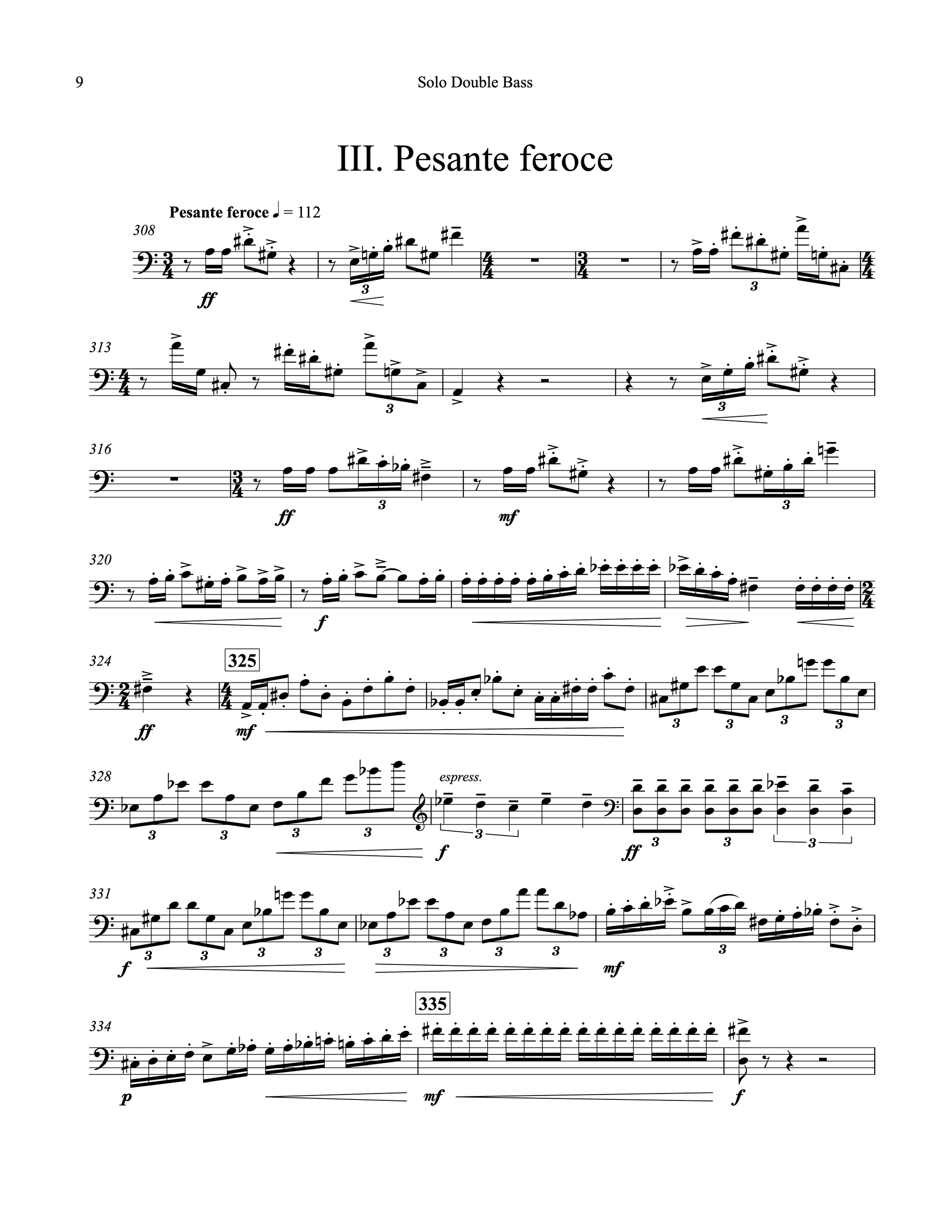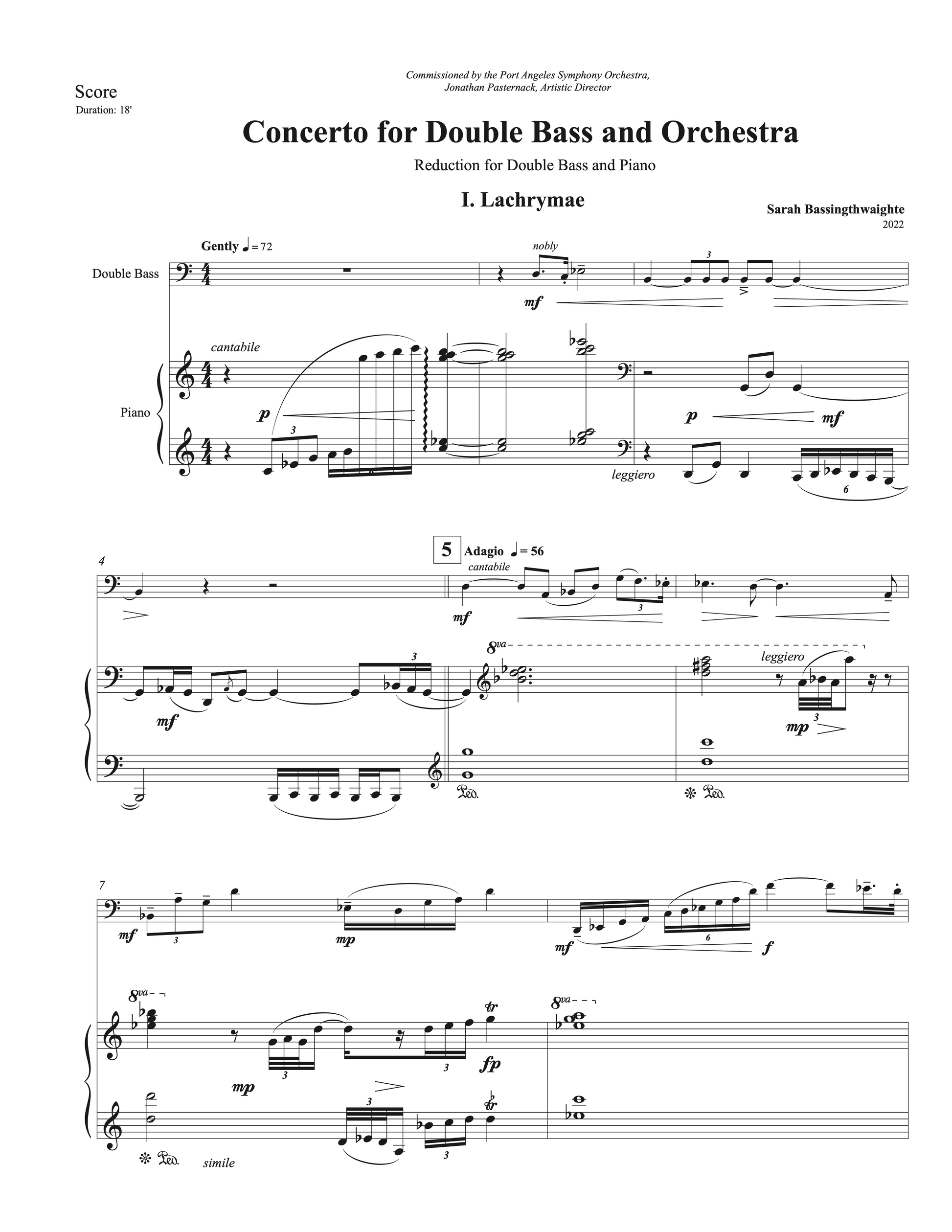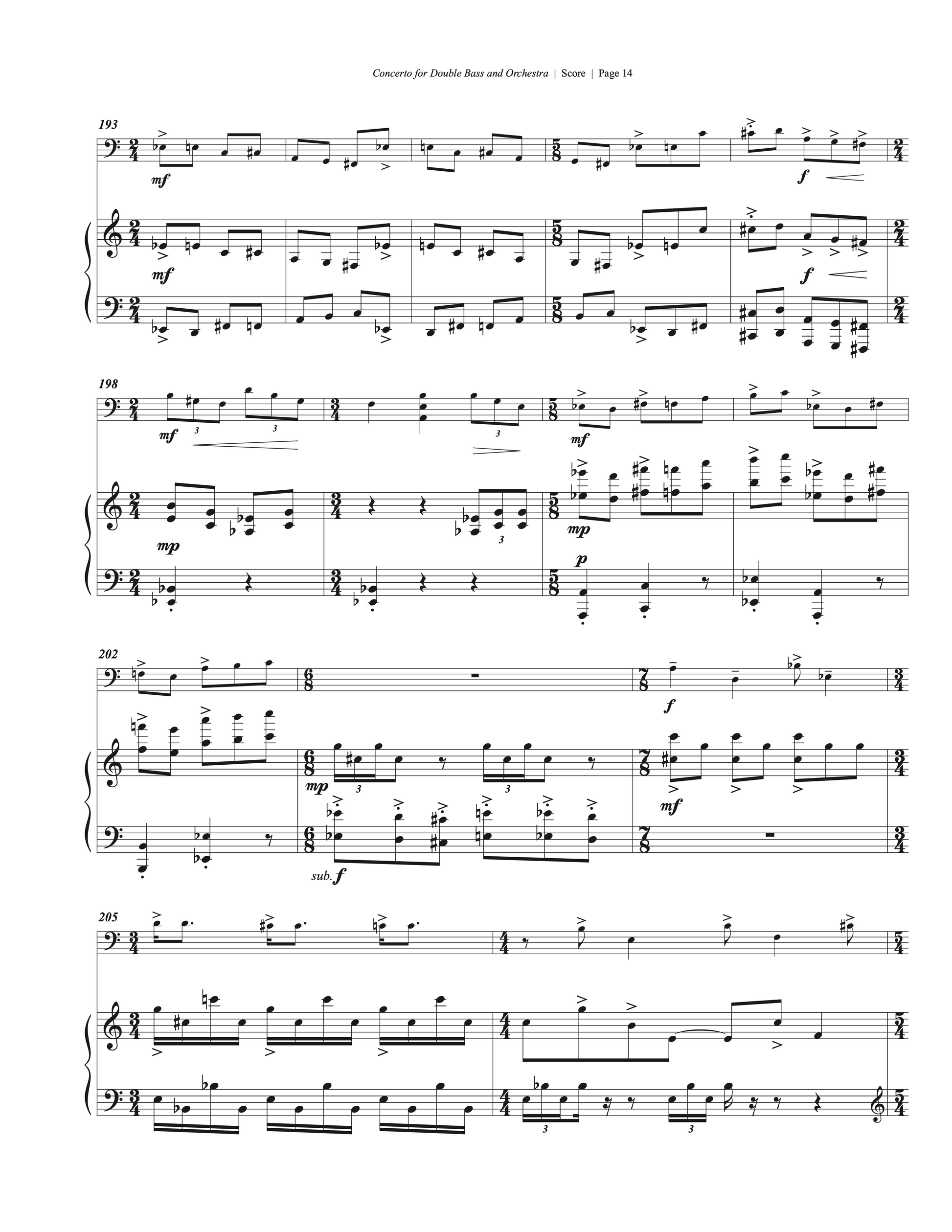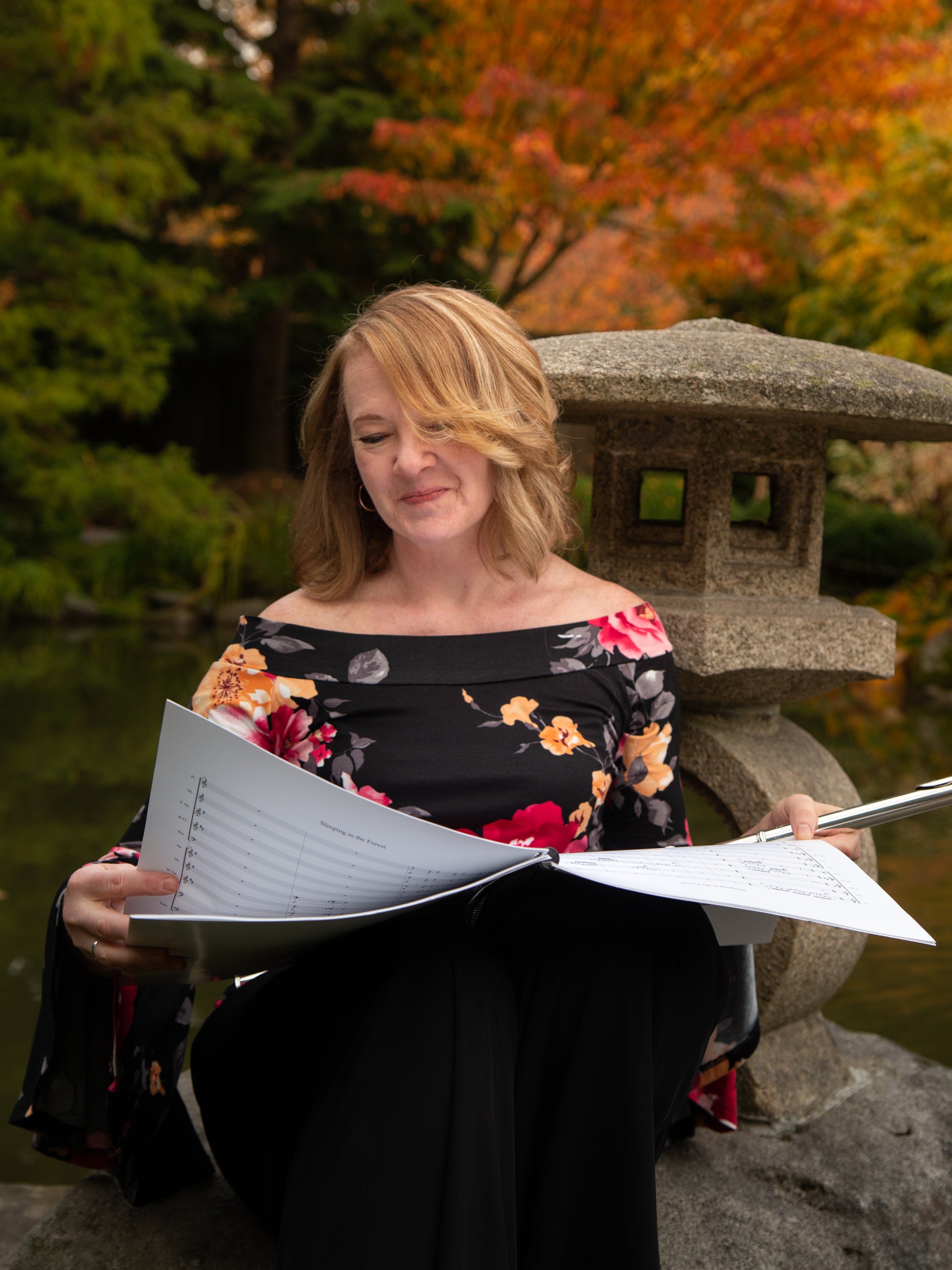Sarah Bassingthwaighte
Sarah Bassingthwaighte: Concerto for Double Bass and Orchestra
Sarah Bassingthwaighte: Concerto for Double Bass and Orchestra
Couldn't load pickup availability
About the Composition
More like a symphony with double bass as a hero, this piece takes the listener through the depths of grief, irreverence, playfulness, and finally rejuvenation and purification through fire. The Concerto for Double Bass and Orchestra was the result of several sources of inspiration. Conductor Jonathan Pasternack dreamed up the idea of the creation of a new piece for the Port Angeles Symphony Orchestra to celebrate their 90th Anniversary.
The idea for the concerto for double bass and orchestra was a combination of the desire to add to the repertoire for the double bass and having an incredible double bass player, Stephen Schermer, to premiere it. In deciding the general stylistic approach to the piece, I wanted to create something that would be virtuosic and fun for the bass soloist, engaging and interesting for the orchestra, and expressive and exciting for the audience. It was inspirational to be in contact with both the conductor and the bassist throughout the composing of this piece. Steve’s hope was for something lyrical, expressive, with a lot of tension and release, and that also used the full range of the double bass (a lot of bass concertos favor the highest range). This sounded perfect to me.
The Concerto is in three movements: Lachrymae, Scherzo, and Pesante feroce. The Lachrymae is the most serious and dramatic movement. Many composers have written movements called lachrymae or lacrimosa, referring to tears. The first of the three movements is the mournful Lachrymae; both the composer and the bassist for whom this was written had recently lost loved ones, which is represented by the teardrop motif (descending notes slurred in twos). The waves of the complex feelings of grief appear as velvety, lush low notes in the bass, as exquisite melodies in the harp and woodwinds, and in the heaviness of the brass. About a third of the way in, the piccolo shares a duet with the bass, who plays a haunting melody using only harmonics. The other primary motive in this movement is the stubborn melody introduced by the solo bass – it consists of a tiny range of a minor 3rd, with the center note reiterated repeatedly. This movement intensifies at a glacial, constrained rate, ultimately reaching a wailing climax; the orchestra then leaves the bass to mourn alone.
The second movement, Scherzo, reveals an irreverent, teasing side of the double bass. The only sounds are percussion and pizzicato and strumming strings, with castanets, woodblocks, and marimba cheekily mocking the strings in syncopated, rhythmically slippery lines. The harmonies are jazzy and the rhythms hemiolic, bestowing a playful impertinence to the movement. The winds get to take a break, leaving just strings and percussion. All of the strings play entirely pizzicato – they don’t use their bows at all. The percussion gets to pull out some of their fun auxiliary instruments – temple bells (or crotales), vibraslap, castanets, and bongos among them. In the middle of the movement, the bass plays a 7-note pattern over the percussion’s 3-beat pattern, intentionally feeling loose and ungrounded. In the bass part, you’ll hear glissandos and slapping the strings.
The Pesante feroce is the high-energy climax of the piece. Short, driving, accented motives are tossed between the bass and the orchestra. The music is often somewhat dissonant, but always directional. A challenge in composing for bass is balance between the bass and the orchestra. Rather than thinning the orchestra, in this movement, I chose to have them alternate quickly, so the orchestra could play with fullness and energy without covering the bass. The middle of this movement slows to a dark, mysterious scene, with a persistent 4-note ostinato that is traded through the winds, brass, percussion, strings, and harp. Fairly quickly, the music returns to the virtuosic, driving bass themes, pushing toward the dramatic final repetition of the opening statement.
Reviews
"Bassingthwaighte's pieces register as vivid tone paintings that in myriad ways call the mystery and magnificence of the natural world to mind. Throughout the recording, Bassingthwaighte's command of orchestration is evident. Each of the four instrumental works evokes vivid impressions." -Textura
"A moving listening experience. Deep, introspective, and adventurous soundscapes. Here, music becomes a vehicle for presenting both images and dimensions—a perfect calligraphy where the mysterious merges with artistic interpretation, and where the enhancement of the instrument becomes the undisputed protagonist." -Music Map
About the Composer
With a career spanning four decades, Dr. Sarah Bassingthwaighte is a Canadian-American composer and flutist who loves to play, teach and create music. She has received accolades in each of these roles in Iceland, England, Europe, Russia, Mexico, and the United States. The London Symphony Orchestra recorded Dr. Bassingthwaighte’s Concerto for Double Bass and Orchestra in 2023, and a full album is in progress for 2025. Other notable performers include members of the Scottish Royal Orchestra, the Seattle Symphony, the Port Angeles Symphony, and the Beaverton Symphony, and soloists including Megan Lanz, Jill Felber, Claudia Anderson, and Steve Schermer. In fall of 2022, Sarah performed the US Premiere of Marquez’ Danzon #3 with guitarist Alejandra Reyes Zamarano and the Northwest Symphony Orchestra. She will be Composer-in-Residence in Sweden, at the Visby International Centre for Composers (VICC)as well as at the Uncool Residency in Switzerland.
Bassingthwaighte is the winner of many competitions, including NACUSA 2025, the 2025 International Couperin Competition in Orchestral Music, the 2024 European Classical Music Awards in Orchestral Music, the Erik Satie International Competition in both Orchestral and Chamber Music, the International Saint-Saëns Competition in Composition in both Orchestral and Chamber Music, and a 2024 and 2025 Finalist for the American Prize. Her compositions also won the Newly Published Music Competition of the National Flute Association in 2013, 2018, 2019, 2020, and 2021. She is the flutist for The Sound Ensemble, the Ecco Chamber Ensemble, and Windsong Classical Trio. She has served on the faculties of University of Washington, Seattle University, the Rachmaninov Institute in Tambov, Russia, the Seattle Youth Symphony, Music Center of the Northwest, and was Founding Director of Affinity Chamber Players during its 13-year lifespan. At the age of 18, she performed Jacques Ibert’s Concerto with the Seattle Symphony, and has since received numerous awards. Her solo CDs include Songs from the Caucasus, Stalks in the Breeze and Flute Meets Machine, and she and Mark Wilson recorded Around the World and Through Time as the ensemble Sirocco.
The British journal Pan Magazine acclaims her “hypnotic and rich sound” and goes on to say “The tone quality is full of depth and power. Bassingthwaighte seems to have a particular talent for communicating the message of contemporary pieces,” which are “performed with polish and virtuosity.” A past president of the Seattle Flute Society, Sarah has been a featured lecturer and performer for the National Flute Association, and a presenter at College Music Society conferences. She actively commissions new pieces for solo flute or chamber ensembles, and has been responsible for the commission, performance, and recording of more than 36 new pieces.
She has a DMA in flute performance and an MM in composition from the University of Washington, an MM in theory and pedagogy from Central Washington University, and a BM Honors in performance from Indiana University, Bloomington. Her flute teachers include Carol Wincenc, Julius Baker, Peter Lloyd, James Pellerite, Felix Skowronek, Bonnie Blanchard and Hal Ott and her composition teachers include Richard Karpen, Diane Thome, John Mickel and Margaret Brouwer. Bassingthwaighte is Head of Composition at Seattle Pacific University. Besides playing music, Sarah loves to hike and travel, especially with her son Izzy and her dog Bibi. They’ve gone to Kenya, Uganda, Ecuador, Peru, Norway, Italy, Russia, Iceland, and more, in a spirit of adventure and broadening perspective.
